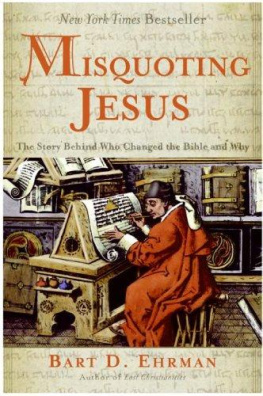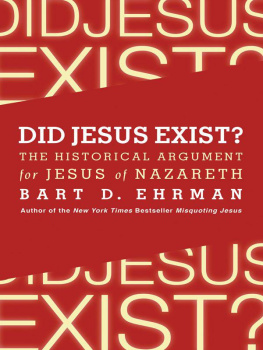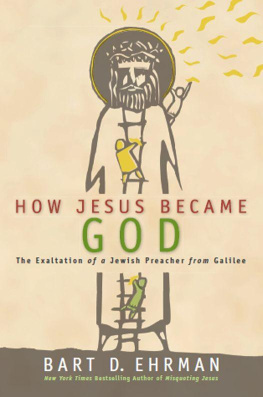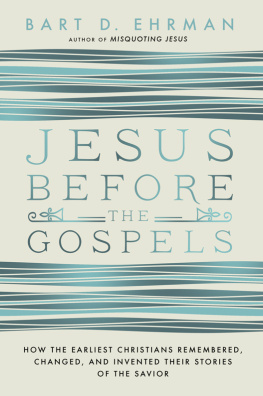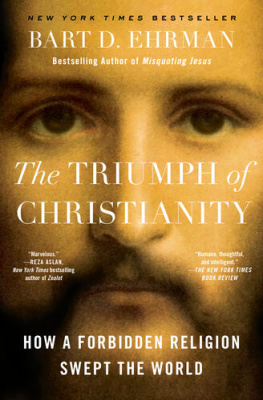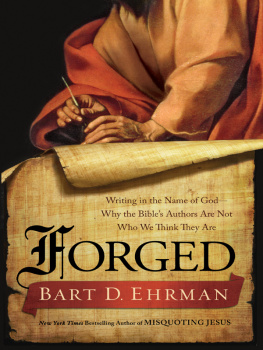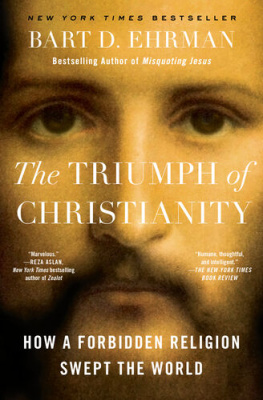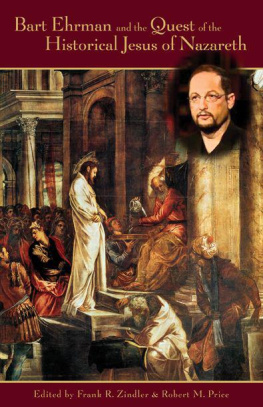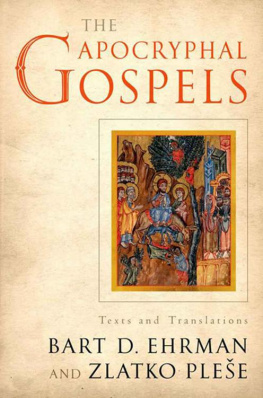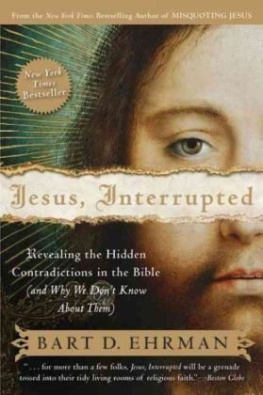Misquoting Jesus: The Story Behind Who Changed the Bible and Why
Bart D. Ehrman
Introduction
More than almost anything I've ever written about, the subject of this book has been on my mind for the past thirty years, since I was in my late teens and just beginning my study of the New Testament. Because it has been a part of me for so long, I thought I should begin by giving a personal account of why this material has been, and still is, very important to me.
The book is about ancient manuscripts of the New Testament and the differences found in them, about scribes who copied scripture and sometimes changed it. This may not seem to be very promising as a key to one's own autobiography, but there it is. One has little control over such things.
Before explaining how and why the manuscripts of the New Testament have made a real difference to me emotionally and intellectually, to my understanding of myself, the world I live in, my views of God, and the Bible, I should give some personal background.
I was born and raised in a conservative place and timethe nation's heartland, beginning in the mid 1950s. My upbringing was nothing out of the ordinary. We were a fairly typical family of five, churchgoing but not particularly religious. Starting the year I was in fifth grade, we were involved with the Episcopal church in Lawrence, Kansas, a church with a kind and wise rector, who happened also to be a neighbor and whose son was one of my friends (with whom I got into mischief later on in junior high schoolsomething involving cigars). As with many Episcopal churches, this one was socially respectable and socially responsible. It took the church liturgy seriously, and scripture was part of that liturgy. But the Bible was not overly emphasized: it was there as one of the guides to faith and practice, along with the church's tradition and common sense. We didn't actually talk about the Bible much, or read it much, even in Sunday school classes, which focused more on practical and social issues, and on how to live in the world.
The Bible did have a revered place in our home, especially for my mom, who would occasionally read from the Bible and make sure that we understood its stories and ethical teachings (less so its "doctrines"). Up until my high school years, I suppose I saw the Bible as a mysterious book of some importance for religion; but it certainly was not something to be learned and mastered. It had a feel of antiquity to it and was inextricably bound up somehow with God and church and worship. Still, I saw no reason to read it on my own or study it.
Things changed drastically for me when I was a sophomore in high school. It was then that I had a "born-again" experience, in a setting quite different from that of my home church. I was a typical "fringe" kida good student, interested and active in school sports but not great at any of them, interested and active in social life but not in the upper echelon of the school's popular elite. I recall feeling a kind of emptiness inside that nothing seemed to fillnot running around with my friends (we were already into some serious social drinking at parties), dating (beginning to enter the mysterium tremendum of the world of sex), school (I worked hard and did well but was no superstar), work (I was a door-to-door salesman for a company that sold products for the blind), church (I was an acolyte and pretty devoutone had to be on Sunday mornings, given everything that happened on Saturday nights). There was a kind of loneliness associated with being a young teenager; but, of course, I didn't realize that it was part of being a teenagerI thought there must be something missing.
That's when I started attending meetings of a Campus Life Youth for Christ club; they took place at kids' housesthe first I went to was a yard party at the home of a kid who was pretty popular, and that made me think the group must be okay. The leader of the group was a twenty-something-year-old named Bruce who did this sort of thing for a livingorganized Youth for Christ clubs locally, tried to convert high school kids to be "born again" and then get them involved in serious Bible studies, prayer meetings, and the like. Bruce was a completely winsome personalityyounger than our parents but older and more experienced than wewith a powerful message, that the void we felt inside (We were teenagers! All of us felt a void!) was from not having Christ in our hearts. If we would only ask Christ in, he would enter and fill us with the joy and happiness that only the "saved" could know.
Bruce could quote the Bible at will, and did so to an amazing degree. Given my reverence for, but ignorance of, the Bible, it all sounded completely convincing. And it was so unlike what I got at church, which involved old established ritual that seemed more geared toward old established adults than toward kids wanting fun and adventure, but who felt empty inside.
To make a short story shorter, I eventually got to know Bruce, came to accept his message of salvation, asked Jesus into my heart, and had a bona fide born-again experience. I had been born for real only fifteen years earlier, but this was a new and exciting experience for me, and it got me started on a lifelong journey of faith that has taken enormous twists and turns, ending up in a dead end that proved to be, in fact, a new path that I have since taken, now well over thirty years later.
Those of us who had these born-again experiences considered ourselves to be "real" Christiansas opposed to those who simply went to church as a matter of course, who did not really have Christ in their hearts and were therefore simply going through the motions with none of the reality. One of the ways we differentiated ourselves from these others was in our commitment to Bible study and prayer. Especially Bible study. Bruce himself was a Bible man; he had gone to Moody Bible Institute in Chicago and could quote an answer from the Bible to every question we could think of (and many we would never think of). I soon became envious of this ability to quote scripture and got involved with Bible studies myself, learning some texts, understanding their relevance, and even memorizing the key verses.
Bruce convinced me that I should consider becoming a "serious" Christian and devote myself completely to the Christian faith. This meant studying scripture full time at Moody Bible Institute, which, among other things, would involve a drastic change of lifestyle. At Moody there was an ethical "code" that students had to sign off on: no drinking, no smoking, no dancing, no card playing, no movies. And lots of Bible. As we used to say, "Moody Bible Institute, where Bible is our middle name." I guess I looked on it as a kind of Christian boot camp. In any event, I decided not to go half-measures with my faith; I applied to Moody, got in, and went there in the fall of 1973.
The Moody experience was intense. I decided to major in Bible theology, which meant taking a lot of biblical study and systematic theology courses. Only one perspective was taught in these courses, subscribed to by all the professors (they had to sign a statement) and by all the students (we did as well): the Bible is the inerrant word of God. It contains no mistakes. It is inspired completely and in its very words "verbal, plenary inspiration." All the courses I took presupposed and taught this perspective; any other was taken to be misguided or even heretical. Some, I suppose, would call this brainwashing. For me, it was an enormous "step up" from the milquetoast view of the Bible I had had as a socializing Episcopalian in my younger youth. This was hard-core Christianity, for the fully committed.
There was an obvious problem, however, with the claim that the Bible was verbally inspireddown to its very words. As we learned at Moody in one of the first courses in the curriculum, we don't actually have the original writings of the New Testament. What we have are copies of these writings, made years laterin most cases, many years later. Moreover, none of these copies is completely accurate, since the scribes who produced them inadvertently and/or intentionally changed them in places. All scribes did this. So rather than actually having the inspired words of the autographs (i.e., the originals) of the Bible, what we have are the error-ridden copies of the autographs. One of the most pressing of all tasks, therefore, was to ascertain what the

